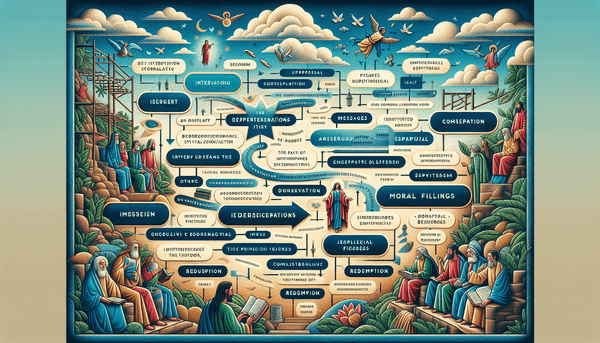The Humility of Jesus: Washing the Disciples' Feet
One of the most profound displays of humility in the Bible is when Jesus washed the feet of His disciples, an act recounted in the Gospel of John (John 13:1-17). This gesture, typically performed by servants, was a radical act that turned social norms upside down. Jesus, the teacher and Lord, knelt before His followers, washing and drying their feet with His own garments. When Simon Peter initially refused, Jesus explained that this act was essential to share in His life, teaching us that true greatness lies in servanthood. The lesson is further underscored by the words of Jesus, 'Now that I, your Lord and Teacher, have washed your feet, you also should wash one another's feet' (John 13:14), urging us to adopt a spirit of humility and service in our interactions with others. This narrative mirrors the call to humility found in Philippians 2:7 and Matthew 20:26-27, and is echoed in Luke 22:27 and 1 Peter 5:5, collectively emphasizing the virtue of humbling oneself and serving others as a reflection of Christ's love.
The Story of Noah's Ark
The tale of Noah's Ark, as told in the book of Genesis (chapters 6-9), is a powerful testament to obedience and faith. God commanded Noah to construct a vast ark, a task that required unwavering faith in the divine plan. Noah's compliance serves as an example of obedient trust in God, even in the face of the unknown. The narrative details how Noah gathered his family and animals of all kinds, ensuring the preservation of life through the ensuing flood, as described in Genesis 7:12, 'And rain fell on the earth forty days and forty nights.' The story reaches its culmination as God establishes a covenant with Noah, symbolized by a rainbow, promising never again to destroy the earth by flood (Genesis 9:13). This account is not only about survival but also about the renewal of life and God's grace, as articulated in Genesis 8:21 and Hebrews 11:7, inspiring us to remain steadfast in our convictions and trust in God's promises.
The Teachings of Jesus
The central tenets of Jesus' teachings are encapsulated in themes of love, forgiveness, and compassion. Throughout His ministry, Jesus imparted wisdom on how to live a life that honors God, with the Sermon on the Mount providing a blueprint for living righteously. The Beatitudes, part of this sermon, offer blessings to those who embody spiritual and moral virtues (Matthew 5:9). Jesus also provided guidance on prayer through the Lord's Prayer (Matthew 6:9-13), and emphasized the importance of treating others with kindness and respect, 'Do to others as you would have them do to you' (Luke 6:31). The Great Commandments, as recorded in Mark 12:30-31, distill Jesus' teachings to their essence: to love God wholeheartedly and to love one's neighbor as oneself. These instructions are reiterated in John 13:34 and are complemented by the call to let our light shine before others (Matthew 5:16), thereby glorifying God through our actions.
Seeking Understanding: The Reality of God and Jesus
Many individuals grapple with the question of God's existence and the reality of Jesus. The Bible acknowledges this innate human curiosity, as noted in Ecclesiastes 3:11, which speaks to the eternity set in each human heart and our incapacity to fathom God's work from beginning to end. This verse suggests that our longing for spiritual understanding is a natural part of our being. For those seeking a deeper connection with the Creator, the Bible acts as a wellspring of wisdom, offering guidance for those who earnestly seek to know God and Jesus more intimately. As Jeremiah 29:13 states, when we seek God with all our heart, we will find Him. The pursuit of understanding is encouraged in the scriptures, with passages such as Matthew 7:7 and James 1:5 inviting us to ask for wisdom and knowledge, promising that our inquiries will be met with generosity from the Almighty, as proclaimed in Proverbs 8:17.
FAQ
Q: Who's feet did Jesus wash in the Bible?
A: In the Bible, Jesus washed the feet of His disciples as a symbol of humility and servanthood. This act is recorded in the Gospel of John, where Jesus washes the feet of His disciples, including Simon Peter.
Q: What are Jesus' teachings?
A: Jesus taught many things during his time on earth. He taught about love, forgiveness, compassion, and the kingdom of God. Some of his most well-known teachings are found in the Sermon on the Mount, where he spoke about the Beatitudes, the Lord's Prayer, and various aspects of living a life that honors God.
Q: Where can I find the story of Noah's ark in the Bible?
A: The story of Noah's ark is found in the book of Genesis, chapters 6 to 9. The specific verses detailing the construction of the ark, the flood, and the aftermath include Genesis 6:9-22, 7:1-24, 8:1-22, and 9:1-17.
Q: Why do I have thoughts about whether God and Jesus are real?
A: It is natural to have thoughts and questions about the existence of God and Jesus. The Bible suggests that the longing for spiritual understanding is a part of human nature, as seen in Ecclesiastes 3:11, which says that God has set eternity in the human heart. This verse implies that many people have an innate desire to understand life's deeper spiritual aspects and the divine.






